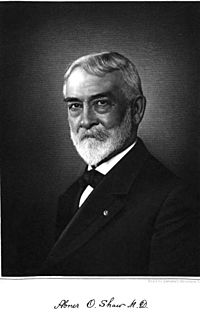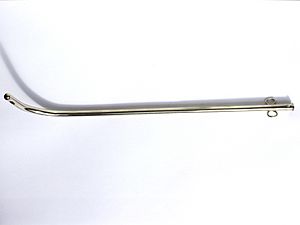Abner O. Shaw facts for kids
Quick facts for kids
Abner O. Shaw
|
|
|---|---|
 |
|
| Personal details | |
| Born |
Abner Orimel Shaw
February 16, 1837 Readfield, Maine |
| Died | January 27, 1934 (aged 96) Portland, Maine |
| Political party | Republican |
| Spouse | Elizabeth Sanford |
| Residence | Portland, Maine |
| Alma mater | College of Physicians and Surgeons |
| Profession | Surgeon, Doctor |
| Military service | |
| Allegiance | United States of America Union |
| Branch/service | United States Army Union Army |
| Years of service | 1862–65 |
| Rank | Private Assistant Surgeon Surgeon |
| Unit | 7th New York Militia 20th Maine Infantry |
| Battles/wars | American Civil War |
Abner Ormiel Shaw (born February 16, 1837 – died January 27, 1934) was an American doctor from Maine. He is best known for serving as a surgeon during the American Civil War with the famous 20th Maine Volunteer Infantry Regiment.
Contents
Early Life and Dreams
Abner Orimel Shaw was born on February 16, 1837, in Readfield, Maine. His parents were Eaton Shaw and Mary Roberts. His father was a Methodist minister. Abner's family had a long history in America, with ancestors arriving on the Mayflower.
As he grew up, Abner had a big dream: he wanted to become a doctor. To make this dream come true, he moved to New York City. There, he enrolled in the College of Physicians and Surgeons.
Serving in the Civil War
While Abner was still studying to become a doctor, the Civil War began. He decided to pause his medical studies to join the fight. He first served as a foot soldier in the 7th New York Militia.
Becoming a Surgeon
After getting a special permission to finish school, Abner graduated in 1863. Soon after, he was assigned to the 20th Maine Volunteer Infantry Regiment. He joined them as an assistant surgeon. This famous regiment had just fought bravely at the Battle of Gettysburg. However, they had done so without a surgeon.
Abner quickly became very busy. The regiment's colonel, Joshua Chamberlain, became very ill with malaria. He even lost consciousness. Colonel Chamberlain was impressed with Abner's skills. He wrote to the governor, asking for Abner to be promoted to full Surgeon.
A month later, Chamberlain wrote again. He said, "Dr. Shaw is doing an excellent job. Few surgeons I've seen have been so dedicated. He has earned the respect of the whole Brigade."
Saving a Commander
Abner received his promotion and continued to serve with the regiment. He was present during the difficult Battle of the Wilderness. In this battle, many soldiers were wounded, including Captain Walter Goodale Morrill and Lieutenant Holman Melcher.
On June 18, 1864, during the Siege of Petersburg, Abner had a very busy day treating wounded soldiers. He then heard that Colonel Chamberlain, who was now leading a different brigade, had been badly wounded. Doctors thought Chamberlain was dying.
Abner rushed to find his former commander. Other doctors had already examined Chamberlain. They found that a bullet had passed through his body, from hip to hip, and through his bladder. At that time, such a wound was almost always fatal. Many soldiers died from similar hip wounds due to severe blood loss.
Chamberlain later described lying on the ground, expecting to die. But Abner Shaw arrived. Using a special metal tube, similar to the one shown here, Abner was able to help drain the urine. This stopped it from leaking through the wound. He also found and tied off major blood vessels to stop the bleeding. Because of Abner's quick and skillful actions, Chamberlain survived the night. He lived for another 50 years! The same wound eventually caused his death in 1914.
Later Service and Departure
Abner continued to serve in other battles. These included the Weldon Railroad, Peeble's Farm, and Hatcher's Run. He became the acting Brigade Surgeon on December 1, 1864. He resigned from the army on February 22, 1865, because he developed malaria.
Life After the War
After the war, Abner Shaw returned home to Maine. He married Elizabeth Sanford. He started a very successful medical practice in Portland, Maine. He continued to work as a doctor for many years.
Dr. Shaw often attended army reunions throughout his life. He stayed in touch with many soldiers from the 20th Maine. Around 1900, he became even closer with General Chamberlain when Chamberlain moved to Portland. In 1914, Dr. Shaw was with General Chamberlain when he passed away. He was also a pallbearer at the General's funeral. Later that year, Dr. Shaw helped write a tribute to General Chamberlain.
Abner Shaw died from pneumonia on January 27, 1934. He was ninety-six years old. He passed away at his home in Portland, Maine's West End.


